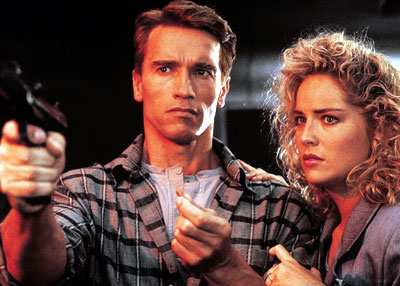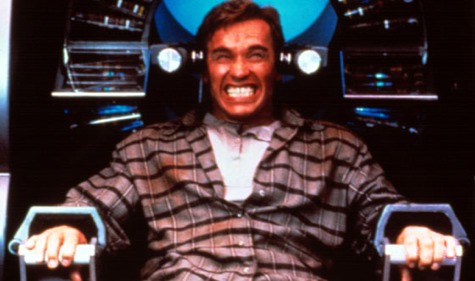One of the major themes of Philip K. Dick’s work—along with drugs and being awesome—is identity. The question of not only who they are, but what it means to simply be in the first place, is a quite common one for a PKD protagonist, perhaps even more so in the film adaptations of his work. Whether this is due to a greater focus on this question by the filmmakers behind those adaptations or a function of the necessary streamlining when turning a book into a movie, movies made from Philip K. Dick novels and stories have identity front and center. While it is more apparently an intellectual and philosophical concern in a picture like Blade Runner, I would argue that it is even more essential when articulated in Arnold’s question, “If I am not me, then who the hell am I?” in Total Recall.
[Read more]
Clearly, there are other concerns in Total Recall (adapted loosely from PKD’s “We Can Remember It For You Wholesale”), as well. Having Arnold Schwarzenegger in the leading role means that many violent things will be done to many people, and having Paul Verhoeven in the director’s chair means that those violent things are going to be extraordinarily well filmed. And, just as clearly, at least part of the apparent intelligence of Total Recall is a function of grading it on the curve compared to other Arnold movies; as ruthlessly enjoyable as Red Heat or Commando may be, they are certainly not untapped granaries of food for thought.
But there’s enough substance to Total Recall, and executed with genuine elegance, that it is not good SF strictly because of that curve. It’s good SF because it manages to address massive existential questions—who am I? what is reality? what does it mean to be?—through cinematic language, and within the context of an exciting, masterfully wrought SF action movie.
After a rousing credit sequence propelled by Jerry Goldsmith’s excellent score, the opening scene is of a moons-lit Martian nightscape, through which a space-suited couple (Arnold, Rachel Ticotin) take a romantic stroll. The stroll is interrupted by Arnold falling off a cliff and smashing his faceplate against a rock. Before he can die of asphyxiation and depressurization (and wonderfully grotesque Rob Bottin makeup effects), Arnold wakes up. So, at the very beginning of the story, we have dreams counterpointed against reality. Then, to blur that line, Arnold’s wife (Sharon Stone) questions him about his dream, gets mad at him (apparently) for dreaming about another woman, but then turns around and immediately has sex with Arnold after this exchange:
Arnold: C’mon baby, you know you’re the girl of my dreams?
Sharon Stone (in a tone of voice that can only be described as meek sexual awe): Do you mean it….?
Arnold: You know I do.
When I was a kid, I took that scene at face value: of course she’s that into Arnold. He’s Arnold. But after I’d been in a relationship for about five minutes I realized “waitaminnit….something’s up here.” Because she breaks the land speed wife/girlfriend record from pissed to un-pissed right there. But this isn’t a major red flag.
What is a red flag is Arnold’s all-consuming obsession with the red planet: he watches a news program about violent political unrest on Mars between the government and rebels, and in spite of watching several people get machine-gunned in the time it takes to eat breakfast, Arnold still turns to Sharon Stone and says, “[Let’s] move to Mars.” She, quite sensibly (based on the information we have at our disposal; who wants to move to some place that’s on the brink of civil war?) tries to talk Arnold out of it. As he leaves for work, the camera holds on her face, and the inscrutable expression on it.
Arnold heads to work. On the subway he sees a TV ad for a company that offers memories of a vacation (one destination explicitly mentioned in the ad is Mars) without having to physically go to the place. Once at work, a building site, where Arnold and co-worker Harry (Robert Constanzo) are so badass that they’re the only two jackhammer operators without goggles or helmets, Arnold asks Robert Costanzo if he’s heard of “dat place vere dey sell dose fake memories” and Robert Costanzo, after launching into a hilariously atonal recitation of the company’s commercial jingle, tells Arnold not to go, as a friend of his “tried one o’ their special offers? Nearly got himself lobotomized.” He further advises Arnold, in one of the more eloquent pieces of pragmatic (if conservative) advice ever given, “Don’t fuck with your brain, pal. It ain’t worth it.” This scene also ends with the camera holding on Robert Constanzo’s face.
Arnold’s fixation on Mars leads him to completely ignore this advice (and this suspicious preponderance of the camera lingering on the expressions of people after he finishes talking to them) and head to the offices of Rekall, Inc. immediately after work. Here he is sold a “vacation” to Mars by the beautifully smarmy Bob McClane (Ray Baker), with the bonus extra feature they like to call “the ego trip,” a vacation from one’s self. Arnold decides to take a break from being Doug Quaid, Earth-bound construction worker, and takes a flier at being a secret agent on Mars who, as McClane puts it, is “a top operative, under deep cover, on your most important mission, people are trying to kill you left and right, you meet this beautiful exotic woman….well, I don’t want to spoil it for you, Doug, but rest assured, by the time the trip is over, you get the girl, kill the bad guys, and save the entire planet” and caps it with the rhetorical question, “Now, you tell me, isn’t that worth a measly 300 credits?” Arnold says yes.
The lab technicians give Arnold a sedative and fine-tune the experience by asking Arnold a number of questions; he dozes off seeing the face of the woman from his dream that opened the movie on a video monitor… but then he has a “schizoid embolism,” which is, hands down, the greatest fake science term in the history of SF. The way the lab tech tells McClane “It looks like we’ve got another schizoid embolism” implies there have been other schizoid embolisms. Which is just lovely.
But I digress. The embolism in Arnold’s mind turns out to be a memory erasure, of a level of sophistication available only to “the Agency.” The Rekall people panic, erase Arnold’s file, refund his money, and dump him in a robot cab. Upon arrival back in his neighborhood, Arnold encounters Robert Costanzo… which is when Arnold’s entire world turns upside down.
It’s earlier, though, when the shift happens. On the DVD commentary, director Verhoeven pinpoints the exact moment when the “dream” and “reality” diverge: when Arnold drifts off to sleep in the implant chair. From that point on, based strictly on the movie itself, despite a bit more evidence pointing to it being all a dream, either interpretation is possible. This is in spite of Verhoeven saying his personal interpretation is that it’s a dream; that he would leave this up to the audience to decide and not simply take his word for it is a degree of trust in one’s audience few filmmakers display these days. Whether one thinks of it as a dream or reality (and for the record, I now favor the former interpretation, after years of the latter, after realizing that every single thing everyone tells Arnold at Rekall comes to pass later in the story) the result is an intricately constructed, massively entertaining SF espionage story.

Visually, Total Recall is in stark contrast to the average modern special-effects movie, coming as it did in the very last days of practical visual effects (simply, effects and elements that are literally physically present in front of a camera), before computer-generated effects became absolutely de rigueur (a major watershed leading to the movie Arnold was able to make as a result of Total Recall‘s success: Terminator 2: Judgment Day, which continued innovations made by director James Cameron in The Abyss on a much larger scale). More than the fact that Total Recall‘s effects—with the exception of the x-ray machine fight scene—were nearly all practical, it also stands out from modern SF and action cinema for the way Paul Verhoeven meticulously composed his shots and camera moves, leading to a clarity of motion and action that seems positively Hitchcockian when compared to the jittery, arbitrary camera that so frequently shoots today’s cinema. Total Recall moves with a feverish energy, but with a visual clarity that allows the audience to catch everything.
Admittedly, some of what the audience catches is extremely graphic violence, and the level of visual clarity allows every last bit of gore to be seen. Arnold movies are always pretty violent, but Paul Verhoeven movies are a step beyond the normal. Total Recall marked his second picture in a row (Robocop being the first) that Verhoeven had to submit—multiple times—to the MPAA to get its rating downgraded from an X to an R. It is virtually impossible to get an X (and, now, an NC-17) for violence. PG-13 movies are allowed to be disturbingly violent. Verhoeven constantly being in X/NC-17 territory should thus say all that is needed about how violent they are, though I would argue that the reason Verhoeven so often finds himself in this situation is precisely because of the visual clarity of his movies. There’s no mistake about what’s going on onscreen, for better or worse.
This is also what makes Total Recall such satisfying science fiction as well. It manages to be intelligent without plodding, ambiguous without being confusing, and picks its suspension of disbelief battles wisely (this is a common theme for Verhoeven, explicitly discussed in a humorous exchange between Sharon Stone and George Dzundza in Basic Instinct). Whenever problematic elements like the core of Mars being made of ice (a “lolwut” point if there ever was one from anyone who ever passed a science class) arise, the movie can be like, “Hey, it could just be a dream” without it feeling like a cop out. This is, after all, a movie that mostly takes place on another planet featuring mind erasure, psychic mutants, and Arnold Schwarzenegger.
Speaking of Arnold, he gives a legitimately good performance in the lead. There’s a lot of excellent work in the supporting cast (Michael Ironside and Ronny Cox are both tremendous), but Arnold really stands out. The worst anyone can hang on him here is a couple of flat line readings, but give him a good script (and Total Recall‘s, despite being stitched together over the course of 15 years, dozens of drafts, and multiple writing teams, ends up miraculously being rather excellent) and his commitment to craft and naturally solid timing make Arnold quite good. Not to mention, one of the requirements of the role is that he kill a lot of people, and no one is better at killing a lot of people than Arnold.
The remake, coming out this August, made the wise decision to depart fairly radically from the original, because there is nothing quite like the Verhoeven-Arnold Total Recall. Quite possibly the best movie Arnold ever made (though arguments are welcome for the first two Terminator movies, as well as Predator and a handful of others), as well as a very strong contender in the “best action movie of all time” discussion, Total Recall is a singular and singularly entertaining movie. I love it dearly.
Danny Bowes is a filmmaker and writer, whose work has appeared on nytheatre.com and premiere.com. He writes a weekly column each Wednesday at Hudak on Hollywood and reviews Asian cinema for Next Projection.










